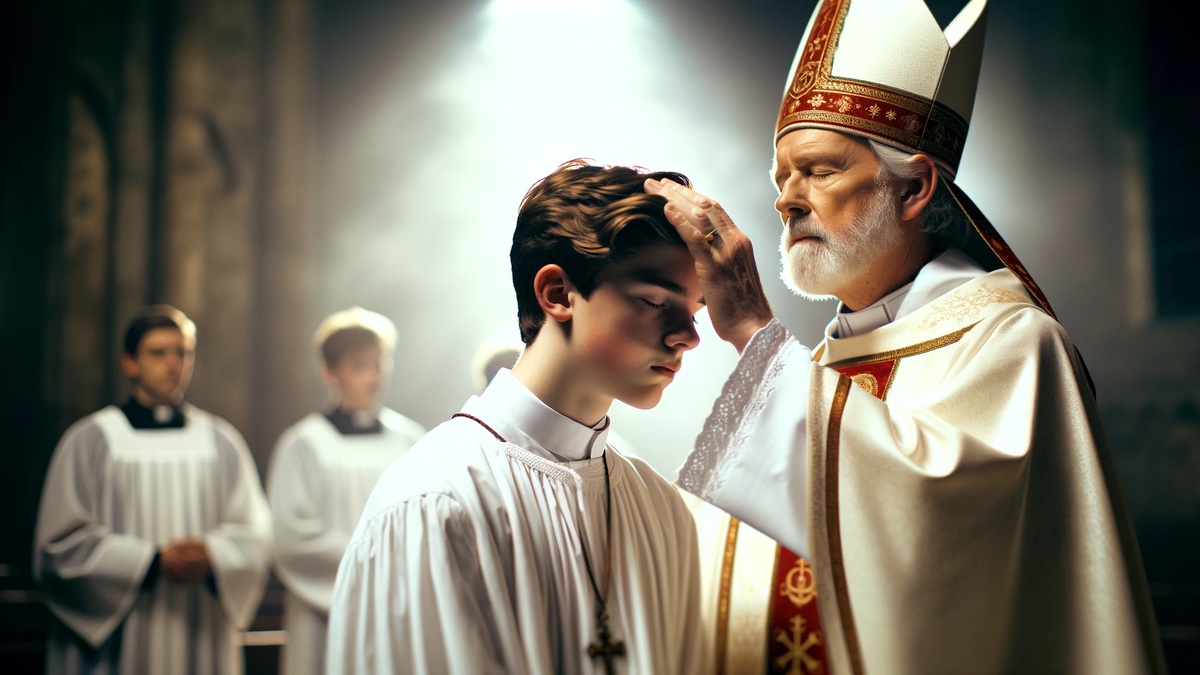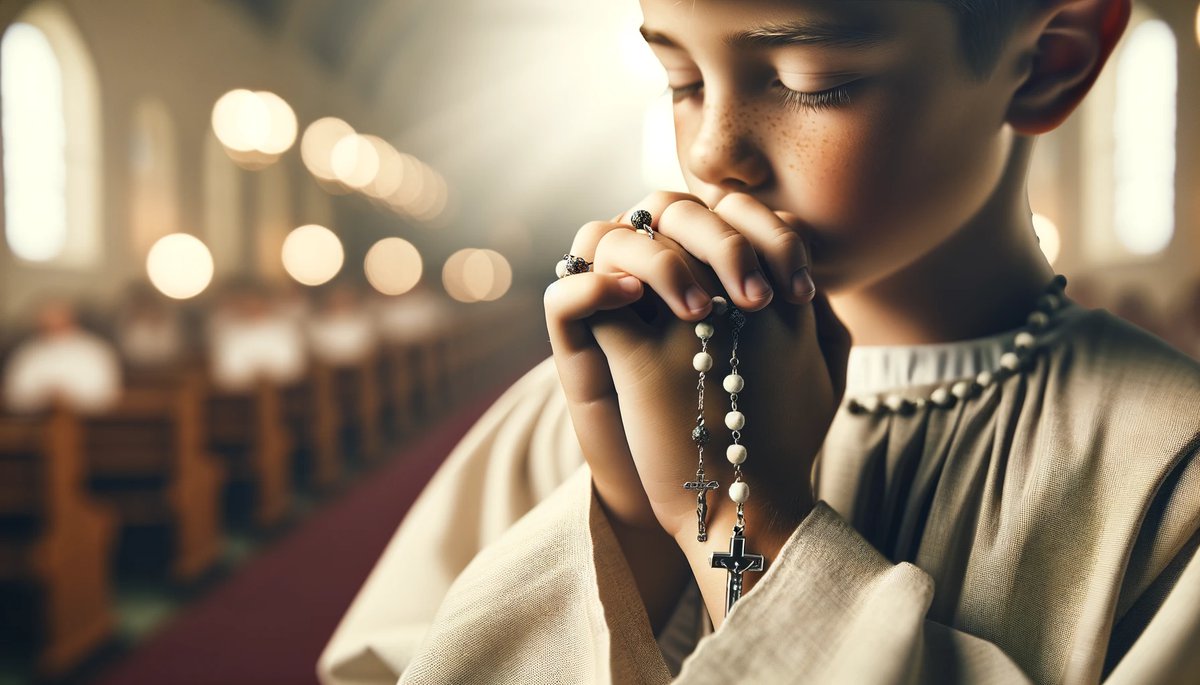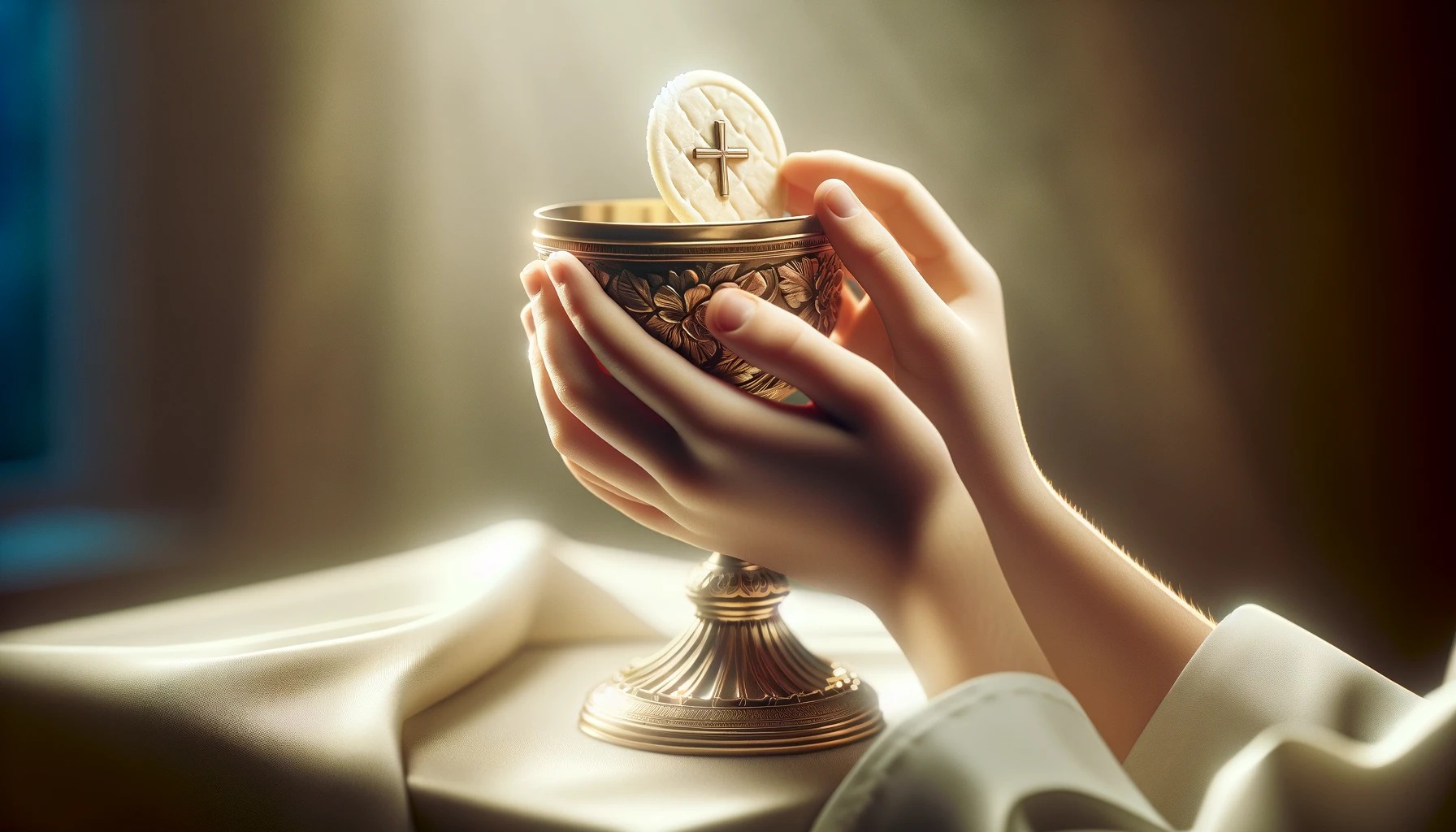Home>Theology and Spirituality>What Is The Significance Of First Communion


Theology and Spirituality
What Is The Significance Of First Communion
Published: February 25, 2024
Ericka Andersen, an editor at Christian.net, expertly merges digital strategy with content creation, focusing on faith and societal issues. Her communication skills enhance the platform's engaging narratives, fostering meaningful dialogue on belief's impact on society.
Discover the significance of First Communion in theology and spirituality. Learn about its importance and traditions in the Catholic faith.
(Many of the links in this article redirect to a specific reviewed product. Your purchase of these products through affiliate links helps to generate commission for Christian.net, at no extra cost. Learn more)
Table of Contents
Introduction
First Communion is a significant and cherished event in the lives of many young Christians. It marks a pivotal moment in their spiritual journey and is often celebrated with great joy and reverence. This sacred rite, also known as Holy Communion or Eucharist, holds deep religious, personal, and cultural significance for individuals and communities around the world.
The act of receiving First Communion is rooted in the traditions of the Christian faith, particularly within the Catholic, Orthodox, and some Protestant denominations. It symbolizes the reception of the body and blood of Jesus Christ through the consecrated bread and wine. This act is based on the Last Supper, where Jesus shared bread and wine with his disciples, instructing them to partake in remembrance of him.
Beyond its religious context, First Communion is a deeply personal and spiritual experience for those who participate. It represents a profound moment of connection with God and the community of believers. For many children, it is their first tangible encounter with the divine, fostering a sense of belonging and identity within their faith tradition.
Moreover, First Communion holds significant cultural and social importance within many Christian communities. It is often accompanied by traditions, rituals, and celebrations that reflect the values and customs of the particular religious group. Families and friends come together to honor and support the communicants, creating lasting memories and strengthening the bonds of faith and fellowship.
As we delve into the historical, religious, personal, and cultural aspects of First Communion, we will gain a deeper understanding of its multifaceted significance and the profound impact it has on the lives of those who partake in this sacred sacrament.
Historical Background of First Communion
The historical roots of First Communion can be traced back to the early Christian Church, where the practice of sharing bread and wine as a commemoration of Jesus' Last Supper with his disciples was established. The Last Supper, a significant event in the life of Jesus, took place during the Passover feast, and it was during this meal that Jesus instituted the sacrament of the Eucharist. He shared bread and wine with his disciples, instructing them to partake in remembrance of him, symbolizing his body and blood.
In the early centuries of Christianity, the Eucharist was celebrated as a central rite of the faith community, and the act of receiving communion held great spiritual and theological significance. As the Church developed its liturgical practices, the reception of the Eucharist became increasingly formalized, with specific guidelines and rituals governing its administration.
The concept of First Communion as a distinct and momentous event in a young person's life began to take shape in the medieval period. During this time, the age of reason, typically around seven years old, was identified as the appropriate age for children to receive the Eucharist for the first time. This age was considered significant as it marked the beginning of a child's ability to understand the spiritual significance of the sacrament and participate fully in the life of the Church.
Over the centuries, various customs and traditions surrounding First Communion emerged within different Christian traditions. In the Roman Catholic Church, the First Holy Communion is often celebrated with special ceremonies, attire, and family gatherings, signifying the child's initiation into the full participation of the Eucharistic celebration. In Eastern Orthodox traditions, infants and young children receive the Eucharist as part of their baptism, affirming their inclusion in the sacramental life of the Church from an early age.
The historical evolution of First Communion reflects the enduring significance of the Eucharist within Christian theology and practice. It underscores the importance of nurturing the faith of young believers and integrating them into the spiritual life of the Christian community. This historical background provides a rich context for understanding the profound impact of First Communion on individuals and the broader Christian tradition.
Religious Significance of First Communion
The religious significance of First Communion is deeply rooted in the theological understanding of the Eucharist within the Christian faith. For Christians, the act of receiving the Eucharist is a sacred and central component of their spiritual journey, signifying the intimate connection with the life, death, and resurrection of Jesus Christ.
At the heart of the religious significance of First Communion is the belief in the real presence of Christ in the consecrated bread and wine. According to Christian doctrine, during the Eucharistic celebration, the bread and wine become the body and blood of Christ through the process of transubstantiation. This transformation is not merely symbolic but is understood as a mystical and profound reality, wherein the essence of the elements is changed while their outward appearance remains the same.
The reception of First Communion is therefore viewed as a moment of encountering the living Christ in a tangible and transformative manner. It is a sacred union with Jesus, where the communicant partakes in the divine life and nourishment offered through the Eucharist. This act of receiving the body and blood of Christ is seen as a source of spiritual sustenance, grace, and unity with the larger body of believers.
Furthermore, First Communion is often considered a significant step in the faith formation of young Christians. It represents their initiation into the full participation of the Eucharistic celebration and the communal life of the Church. Through this sacramental experience, children are invited to deepen their relationship with God and the Christian community, fostering a sense of belonging and spiritual growth.
In many Christian traditions, the preparation for First Communion involves catechesis, where children are instructed in the meaning and significance of the Eucharist. This educational process aims to instill a deeper understanding of the sacrament and its role in the life of faith. It also serves as a means of nurturing the spiritual development of young believers, equipping them to approach the Eucharist with reverence, understanding, and devotion.
The religious significance of First Communion extends beyond the individual experience, encompassing the communal and ecclesial dimensions of the Christian faith. It serves as a visible expression of unity and fellowship within the body of Christ, as believers come together to partake in the shared meal that symbolizes their common bond in Christ.
In essence, the religious significance of First Communion lies in its embodiment of the profound mystery of the Eucharist and its role in shaping the spiritual identity and communal life of believers. It stands as a testament to the enduring presence of Christ in the life of the Church and the transformative power of the sacraments in the lives of individuals.
Personal and Spiritual Significance of First Communion
First Communion holds profound personal and spiritual significance for individuals, marking a pivotal moment in their faith journey. At the core of its personal significance is the deep sense of connection and intimacy with God that the communicant experiences. It represents a tangible encounter with the divine, fostering a profound awareness of God's presence and love. For many children, it is their first conscious participation in a sacred ritual, evoking a sense of wonder and reverence as they partake in the Eucharist.
On a spiritual level, First Communion signifies a significant milestone in the communicant's relationship with God. It is a moment of grace and spiritual nourishment, where the individual receives the body and blood of Christ, strengthening their bond with Jesus and the Christian community. This sacramental encounter is believed to impart spiritual blessings, offering solace, guidance, and a deepened awareness of God's presence in their lives.
Moreover, First Communion serves as a formative experience that shapes the spiritual identity of the communicant. It instills a sense of belonging within the faith community and reinforces the values and teachings of the Christian tradition. The communicant is invited to reflect on the significance of the Eucharist in their lives, deepening their understanding of the Christian faith and their role within the larger body of believers.
The personal and spiritual significance of First Communion extends beyond the individual, influencing their familial and social dynamics. It often becomes a cherished family event, strengthening familial bonds and passing down religious traditions from one generation to the next. The spiritual growth and maturation experienced during First Communion contribute to the overall well-being of the individual, nurturing their moral and ethical development.
In essence, the personal and spiritual significance of First Communion lies in its transformative impact on the individual's relationship with God, the Christian community, and their own spiritual identity. It is a sacred milestone that shapes their understanding of faith, morality, and the enduring presence of God in their lives. This profound experience resonates deeply within the hearts and souls of those who partake in this sacred sacrament, leaving an indelible mark on their spiritual journey.
Cultural and Social Significance of First Communion
The cultural and social significance of First Communion extends far beyond its religious aspects, permeating the traditions, customs, and familial dynamics within Christian communities. This sacred rite often serves as a cornerstone of cultural identity, reflecting the values and beliefs of the faith tradition while fostering a sense of communal celebration and solidarity.
In many Christian cultures, the celebration of First Communion is accompanied by a rich tapestry of customs and rituals that are deeply ingrained in the community's heritage. Families prepare for this momentous occasion with great care and attention, often incorporating elements of cultural significance into the festivities. Traditional attire, such as white dresses for girls and suits for boys, symbolizes purity and reverence, adding a cultural dimension to the event. These garments, often passed down through generations, carry profound familial and cultural significance, embodying the continuity of faith and tradition within the community.
Furthermore, the act of celebrating First Communion often brings together extended family members, friends, and fellow parishioners, creating a sense of communal joy and support. The event becomes a communal expression of faith, uniting individuals in their shared beliefs and values. It serves as a testament to the interconnectedness of the community, reinforcing the bonds of fellowship and solidarity among believers.
In addition to the familial and communal aspects, First Communion also holds social significance within the broader cultural context. It is not uncommon for communities to organize special gatherings, feasts, and other festivities to honor the communicants. These social gatherings provide an opportunity for the community to come together, strengthening social ties and fostering a sense of belonging and shared purpose.
Moreover, the cultural and social significance of First Communion is evident in the lasting impact it has on the lives of the communicants. The memories and traditions associated with this sacred rite often shape their cultural identity and sense of belonging within their faith community. The values and customs imparted during First Communion celebrations serve as a cultural inheritance, carrying forward the rich tapestry of faith and tradition to future generations.
In essence, the cultural and social significance of First Communion underscores its role as a unifying force within Christian communities, weaving together elements of tradition, celebration, and communal solidarity. It stands as a testament to the enduring cultural and social impact of this sacred sacrament, enriching the lives of individuals and communities alike.
Read more: What Is First Communion?
Conclusion
First Communion, with its rich historical, religious, personal, and cultural significance, stands as a profound and multifaceted sacrament within the Christian faith. From its early roots in the traditions of the Church to its enduring impact on individuals and communities, First Communion embodies the essence of spiritual connection, cultural heritage, and communal celebration.
The historical background of First Communion reveals its deep roots in the early Christian Church, where the practice of sharing the Eucharist as a commemoration of Jesus' Last Supper was established. Over time, the sacrament evolved, incorporating specific customs and traditions within various Christian denominations, reflecting the enduring significance of the Eucharist in the life of the Church.
The religious significance of First Communion is rooted in the theological understanding of the Eucharist as a sacred and central component of the Christian faith. It symbolizes the real presence of Christ in the consecrated elements, offering believers a tangible encounter with the divine and fostering a sense of spiritual nourishment and unity within the Christian community.
On a personal and spiritual level, First Communion holds profound significance for individuals, marking a pivotal moment in their faith journey. It represents a sacred union with God, shaping the spiritual identity of the communicant and fostering a deepened awareness of God's presence in their lives. This transformative experience resonates deeply within the hearts and souls of those who partake in this sacred sacrament, leaving an indelible mark on their spiritual journey.
Furthermore, the cultural and social significance of First Communion is evident in the traditions, customs, and familial dynamics within Christian communities. It serves as a cornerstone of cultural identity, reflecting the values and beliefs of the faith tradition while fostering a sense of communal celebration and solidarity. The event becomes a communal expression of faith, uniting individuals in their shared beliefs and values, and reinforcing the bonds of fellowship and solidarity among believers.
In conclusion, First Communion stands as a testament to the enduring presence of Christ in the life of the Church and the transformative power of the sacraments in the lives of individuals. It embodies the essence of spiritual connection, cultural heritage, and communal celebration, leaving an indelible mark on the lives of those who partake in this sacred sacrament.














